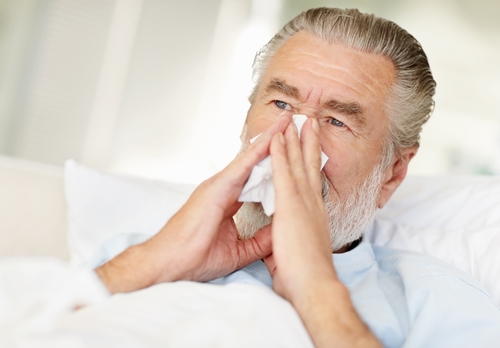Common Cold Prevention and Treatment

From time to time, nearly everyone will develop a cold. In fact, the average adult will catch a cold between two and three times per year. Here’s the best common cold prevention and treatment we could find. For most people, colds are not severe and will disappear on their own after a few days. According to the American Lung Association, a cold will typically last up to one week, though the illness can last longer among some, including seniors.
Common Cold Prevention and Treatment: The Best Options
Most adults who become sick will catch a cold between September and May. The illness is highly contagious and can be spread easily by bodily fluids. For senior wellness, adults should be aware of the common symptoms, prevention methods and how to treat the illness.
Cold symptoms
There are several symptoms of the cold that can range in severity. However, not all symptoms are indicative of a cold but could be something more serious like the flu. Most cold symptoms are related to the throat and nose but might also include a low-grade fever. The most common symptoms include:
- Runny nose
- Congestion
- Cough
- Scratchy throat
- Headache
- Body aches
Prevention
Handwashing is one of the best ways to avoid catching a cold. As it is an illness easily spread from person to person through contact, washing hands and using disinfectants can help reduce spreading or picking up germs. When cold seasons hits, seniors should wash their hands multiple times per day with hot water and soap. Others around them should do the same. In general, it can be best to avoid coming into close contact with a person who has a cold.
The virus that causes the cold can remain on surfaces for hours, so disinfecting contaminated areas can reduce germs and the likelihood that more people will become infected. Unlike the flu vaccine, there is no preventive medical shot or medicine that can keep a person from becoming sick. Because there are so many viruses that can cause a common cold – more than 200, according to the Centers for Disease Control and Prevention – doctors have yet to find a vaccine that can effectively reduce the illness.
Vitamin C
A recent study has revealed that vitamin C might not be the most effective preventative measure against a cold. Instead, it has been suggested that zinc may be more beneficial. In research published in the Canadian Medical Association Journal, a zinc supplement was found to have the most impact on preventing the common cold. In the study, more than 150 common cold remedies were measured, including the long-regarded cure all of vitamin C.
Zinc can be found in meat, beans and nuts, and it can greatly reduce the number of colds each year when consumed regularly. However, supplements provide the same benefits. Other methods for cold prevention – from gargling water to eating garlic – had little effect compared to zinc.
Treatment
While there is no cure for the common cold, symptoms will usually subside on their own after a few days. When a person is sick, however, symptoms can be debilitating. In general, antibiotics will not help clear a common cold because it is caused by a virus. Antibiotics will only be effective if a person has a bacterial infection.
When a person becomes sick, the best method for treatment includes taking over-the-counter medicines that can reduce the impact of symptoms. Drinking fluids and resting are also most commonly prescribed to treat a cold. Only when symptoms become severe, such as a high temperature, do other medical measures need to be taken.
To maximize your Senior Health Insurance benefits, visit MySeniorHealthPlan.com for quick, simple and easy information.
- How Medicare Advantage Plans Cover Seniors’ Vision, Hearing, and Dental Needs - October 29, 2024
- 2025 Medicare Part D Changes: How to Save on Prescriptions - October 25, 2024
- Everything You Need to Know About the 2025 Medicare Changes and How They Affect You - October 21, 2024

